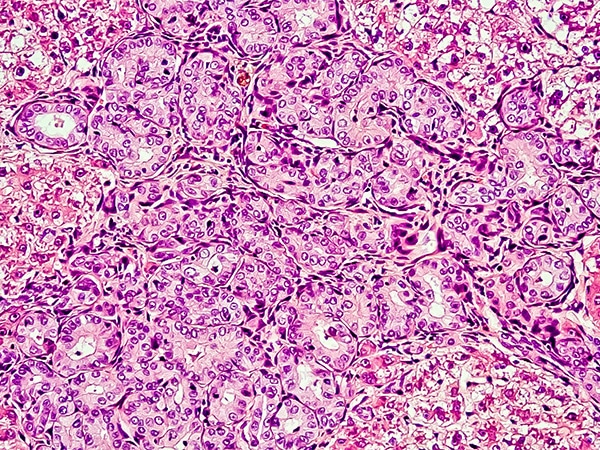Expanding Immunotherapy Options for Liver Cancer Patients
The FDA approval of pembrolizumab for treating certain patients with liver cancer makes it the second immunotherapeutic approved for this use.

The U.S. Food and Drug Administration (FDA) recently approved expanding the use of pembrolizumab (Keytruda), a type of immunotherapeutic called a checkpoint inhibitor, to include the treatment of certain patients with liver cancer.
As a result of the new approval, pembrolizumab can now be used for treating patients with hepatocellular carcinoma — the most common form of primary liver cancer diagnosed in the United States — that has progressed despite treatment with the molecularly targeted therapeutic sorafenib (Nexavar). Sorafenib has been the standard first treatment for patients diagnosed with advanced hepatocellular carcinoma since it was first approved by the FDA in 2007.
Pembrolizumab is the second checkpoint inhibitor to be approved for treating patients with hepatocellular carcinoma that has progressed despite treatment with sorafenib. The first was nivolumab (Opdivo), which was approved for this use in September 2017.
Liver cancer incidence and death rates have been increasing in the United States for the past four decades. In fact, liver cancer incidence rates more than tripled from 1975 to 2015, rising from 2.6 to 9.1 new cases per 100,000 U.S. adults. During the same period, liver cancer death rates more than doubled, increasing from 2.8 to 6.6 deaths per 100,000 U.S. adults. These grim statistics highlight the need for new approaches to preventing, detecting, diagnosing, and treating the disease.
The approval of pembrolizumab for treating patients with hepatocellular carcinoma who have already been treated with sorafenib was based on results from the phase II KEYNOTE-224 clinical trial, which were published recently in Lancet Oncology. Among 104 patients whose advanced hepatocellular carcinoma had progressed despite treatment with sorafenib, pembrolizumab led to partial or complete tumor shrinkage in 18 patients, or 17 percent. The responses lasted six months or longer for 89 percent of these 18 patients and 12 months or longer for 56 percent.
Pembrolizumab works by releasing a brake called PD-1 on cancer-fighting immune cells called T cells. Given that it targets the immune system and not molecules specific to a particular cancer, it has been found to have relatively broad utility in the treatment of cancer.
Before this approval for liver cancer, pembrolizumab had already been approved for treating certain patients with eight other types of cancer: bladder cancer, cervical cancer, head and neck cancer, lung cancer, Hodgkin lymphoma, non-Hodgkin lymphoma, stomach cancer, and melanoma. It also is approved for treating patients with any type of solid tumor that is characterized by the presence of specific biomarkers known as microsatellite instability-high or mismatch repair-deficient.
Pembrolizumab is being tested in clinical trials for several other cancer types. Although many of these trials have not yet reported data, Merck, the company that develops and manufactures pembrolizumab, announced on Nov. 14, 2018 that the immunotherapeutic significantly improved overall survival compared with chemotherapy among patients with advanced esophageal or esophagogastric junction carcinoma who have tumors with high levels of PD-L1. The company also stated that it would be submitting these data to regulatory authorities, increasing the likelihood that we will see further expansion of the use of pembrolizumab in the future.
The FDA approval of pembrolizumab for the treatment of hepatocellular carcinoma was rendered on Nov. 9, 2018.
